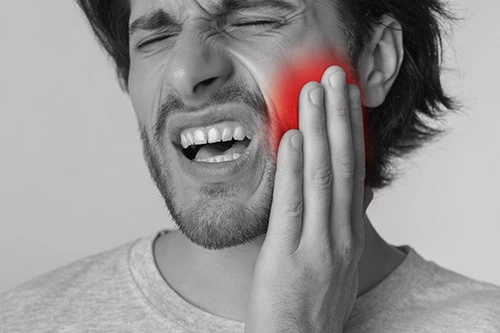New
Special Offers For: Pediatric Children's Dentistry + Braces for All Ages. Limited Time Offer
Open ’til 7pm + Saturday
Call Us
832-804-7427
832-804-7427
Dental emergencies can happen at any time, causing confusion and anxiety within afflicted people. They often aren’t sure what they need to do, which can exacerbate the confusion. However, with Lovett Dental, you don’t need to worry because all that stands between you getting the dental emergency dealt with is a quick phone call.
Do not hesitate to ring us at (832) 804-7427 if you’re experiencing a dental emergency such as the ones we mention below. No matter what sort of dental emergency you’re experiencing, our emergency dentist in Corpus Christi will take care of it.
If you start feeling any sort of discomfort in your mouth (especially pain), that could be a sign that something isn’t quite right. Here’s what you should do if you’re having tooth discomfort:
Get some warm water to rinse your mouth with to remove any potential debris or obstructions. Floss around the afflicted tooth to get rid of any tiny pieces of food or debris that might be stuck under the gums or in the crevices.
If the pain persists, give us a call and we’ll schedule an imminent dentist appointment.
Usually, you can expect some pain (for around 24 hours) after having your retainers or braces changed. There are two methods with which you can try to reduce the pain. These include taking pain medicine (as instructed on the bottle) or rinsing your mouth with warm salt water.
But, you’ll need to deal with the source of the pain. This can include a multitude of things so here’s a short guide on what you should do in such situations:
If you notice any swelling in your gums, abscesses, or infection in the root of your tooth/teeth, you’ll need to see a dentist immediately. There are numerous reasons as to why you’re experiencing swelling or abscessed gums, and the only way to determine the exact cause is through a comprehensive and detailed dental exam.
If an abscess breaks before you’re able to visit the dentist, you’ll need to be very careful. The painful area may fill with pus which has a very unpleasant taste and smell. If this happens, you must use warm water to rinse your mouth immediately.
People break or chip their teeth all the time by accident. Thankfully, we live in a time when dental reconstruction is available to everyone. But keep in mind that if you experience such an issue, you will have to visit the dentist to determine whether or not it’s possible to repair parts of a fractured or chipped tooth or if you’ll need a replacement.
Also, when you come in for your dentist appointment, make sure to bring the chipped tooth piece with you. Here’s what you should do prior to visiting the dentist:
You shouldn’t worry too much if your child loses a tooth due to injury but we recommend contacting a dentist just in case. Usually, the permanent tooth that will grow when the child is older will replace the missing tooth in its entirety without any interventions from outside.
Only a qualified and experienced dentist will be able to tell you whether or not there’s a chance to reimplant that tooth that fell out (or knocked out). As soon as you read the next paragraph, make sure to contact your dentist to set up an appointment.
The process of protecting the knocked-out tooth prior to going in for an appointment is the same as for chipped teeth - rinse your mouth with warm water and apply gauze, use a cold compress to stop the bleeding, and keep the tooth in a small container in either milk, water with a pinch of salt, or the injured person’s spit.
If a crown or filling went missing from your tooth, you’ll need to react quickly to stop the pain from spreading. Teeth that lose their fillings or crowns tend to be highly sensitive to air which often causes pain. The best way to deal with this is to use clove oil. Dip a cotton swab in the clove oil and place it on the exposed tooth.
However, there’s no avoiding visiting the dentist. You’ll need to protect the exposed tooth with a new crown or filling as soon as possible to prevent infection.
Mouth injuries and cuts can cause big problems down the line, mostly attributed to infection. But there’s nothing to worry about if the cut from a lip or tongue bite is smaller than ¼ inch. In this case, gently clean the area with gauze and apply a cold compress, ice pack, or a bag of frozen veggies or fruits.
If the cut is larger than ¼ inches or if the area continues to bleed, seek medical attention immediately.
You can easily burn the roof of your mouth by eating food that’s too hot (such as soup or pizza). The reason for this is that the skin is very thin and soft and is more vulnerable to burns than, for example, the skin on your hands.
If you experience blisters or sores after burning the roof of your mouth and they don’t go away and heal in 10 days or fewer, be sure to visit the Lovett Dental emergency dentist in Corpus Christi.
While you wait, you can make the healing process a bit more comfortable for yourself by rinsing with warm salt water after each meal you have throughout the day (⅛ teaspoon in 8 ounces of water) to stop bacteria from growing and spreading. If you need to relieve some pain, get a local or oral anesthetic. We recommend Acetaminophen for this.
If you want to know more about what to do in such situations, want to schedule an appointment, or have a dental emergency - don’t hesitate to contact us.

Lovett, Splendid & Haven Dentistry
Dental Offices in TX